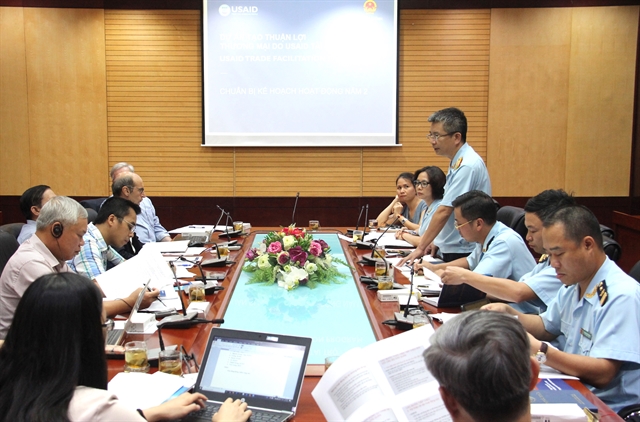Viet Nam's customs authority and US Agency for International Development are working to promote the Trade Facilitation Programme, focusing on specialised inspection of import and exports.

The General Department of Vietnam Customs and the US Agency for International Development (USAID) are working to promote the Trade Facilitation Programme (TFP) with a focus on improving specialised inspection of import and exports.
TFP, funded by the USAID, was approved by the Prime Minister in May this year. The Ministry of Finance is the project manager and the Customs Department was assigned to implement the project.
The five-year, US$21.7 million programme, aims to reform, standardise, harmonise and simplify administrative procedures in import and export activities in line with international standards.
“The programme helps reform specialised inspection procedures and improve the effectiveness of the National Single Window (NSW) system. This is a field that is very much related to many ministries and agencies,” Mai Xuan Thanh, deputy director of General Department of Vietnam Customs, said at the meeting on Tuesday with other local ministries and USAID experts.
Thanh expected the ministries and sectors to actively coordinate with the customs authority and USAID experts to implement the programme.
According to a USAID representative, Viet Nam has become one of the most open economies in the world in the last two decades. However, inadequacies in clearance procedures of goods are hindering the country’s trade competitiveness.
Specialised inspection involves many ministries and industries which has caused significant delays in goods clearance, raising costs for small- and medium-sized enterprises.
TFP aims to support the Vietnamese customs and specialised inspection agencies to adopt and implement a risk management approach, which will strengthen the implementation of the World Trade Organisation’s Trade Facilitation Agreement. This will also help Viet Nam achieve its development goals while reducing trade time and costs, the USAID representative said.
According to the ASEAN National Steering Committee for Single Window (ASW), NSW and trade facilitation Commission 1899, in 2015, 13 ministries and sectors issued lists of 82,698 goods subject to specialised inspection.
The Ministry of Agriculture and Rural Development (MARD) has the largest number of 65,185 items, accounting for nearly 79 per cent of the country’s total. Other ministries with high numbers of specialised inspection requirements include the ministries of Health (5,730), Industry and Trade (5,096), Science and Technology (3,434), Transport (1,433) and Information and Communications (1,034).
Ending April this year, the list of specialised inspection goods decreased to 70,087.
The Vietnamese Government has taken drastic measures to improve the business and investment environment, enhance national competitiveness and promote business equality.
In September last year, the Prime Minister signed a decision on approving the action plan to promote the NSW, ASW mechanism, reforming specialised inspection of import and export foods for the 2018-20 period, with a goal of reducing the proportion of goods subject to specialised inspection to below 10 per cent by 2020. — VNS





